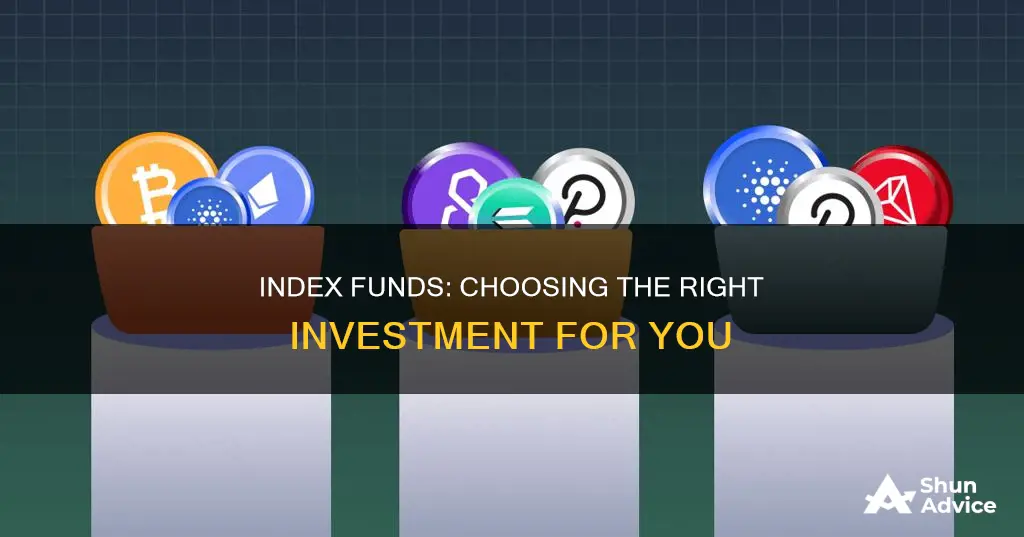
Index funds are a type of mutual or exchange-traded fund (ETF) that tracks the performance of a market index, such as the S&P 500, by holding the same stocks or bonds or a representative sample of them. Index funds are defined as investments that mirror the performance of benchmarks like the S&P 500 by mimicking their makeup. These passive investments are a low-cost, easy way to build wealth and are ideal for long-term investing, such as retirement accounts.
| Characteristics | Values |
|---|---|
| Type of fund | Mutual fund or exchange-traded fund (ETF) |
| Investment strategy | Passive |
| Investment aim | To mirror the performance of a designated index |
| Management | Passive, no active decision-making |
| Costs | Low fees and expense ratios |
| Risk | Low, due to diversification |
| Returns | Historically, index funds have outperformed actively managed funds |
| Tax | More tax-efficient than actively managed funds |
| Investment minimum | Varies, can be as low as $0 |
| Account minimum | Varies, can be as low as $0 |
| Best for | Long-term investors |
What You'll Learn

Understand the benefits of index funds
Index funds are a great investment option for those looking to build wealth over the long term. Here are some of the benefits of investing in index funds:
Low Costs
Index funds are passively managed, meaning they aim to replicate the performance of a specific market index without the need for active management. As a result, they have much lower management fees than other funds. Index funds also have lower transaction costs since they trade securities less frequently. These lower costs can lead to higher returns for investors, especially over the long term.
Tax Advantages
Index funds generate less taxable income than actively managed funds because they trade securities less often. Additionally, when selling securities, index funds can choose from various lots with the lowest capital gains, minimising the tax burden passed on to shareholders.
Diversification
Index funds provide investors with a diversified portfolio of securities, reducing the risk of significant losses if a few companies in the index underperform. This diversification also helps to smooth out volatility and provides exposure to a wide range of companies and sectors.
Strong Performance
Over time, index funds have consistently outperformed actively managed funds in terms of total returns. This is due to their low fees and the fact that fund managers rarely beat the market consistently over the long term.
Simplicity
Index funds are easy to invest in and require minimal research. They are also a more hands-off investment option, as there is no need to actively select securities or time the market.
Liquid Funds: Smart Investment for Quick, Safe Returns
You may want to see also

Research different types of index funds
Index funds are a type of mutual fund or exchange-traded fund (ETF) that tracks the performance of a market index, such as the S&P 500, by holding the same stocks or bonds or a representative sample of them. Index funds are defined as investments that mirror the performance of benchmarks like the S&P 500 by mimicking their makeup.
Index funds are available across a variety of asset classes. Investors can buy funds that focus on companies with small, medium, or large capital values. Other funds focus on a sector, like technology or energy.
- Large-cap index funds: These funds track indexes composed of large-cap companies, such as the S&P 500 or the Dow Jones Industrial Average. These indexes typically include a broad range of companies across various sectors and are considered a diversified investment.
- Small-cap and mid-cap index funds: These funds track indexes composed of small-cap or mid-cap companies, such as the Russell 2000 Index. These funds offer exposure to smaller companies that may have higher growth potential but also come with higher risks.
- Sector index funds: These funds focus on a specific sector or industry, such as technology, healthcare, or consumer goods. For example, an investor interested in the technology sector might consider an index fund that tracks the Nasdaq Composite Index or a specific tech-focused index.
- International index funds: These funds invest in companies or indexes outside of the investor's domestic market, offering exposure to international markets and currencies. For example, the MSCI EAFE Index tracks large and mid-cap companies in developed countries outside of the U.S. and Canada.
- Bond index funds: These funds track indexes composed of bonds, such as the Bloomberg Barclays Global Aggregate Bond Index. Bond index funds offer a more stable investment option and are often used to diversify a portfolio and reduce risk.
When researching different types of index funds, it is important to consider factors such as the fund's fees, performance, diversification, and investment strategy. It is also essential to align the fund with your investment goals, risk tolerance, and time horizon.
Mutual Funds: Smart Investment, Smart Returns
You may want to see also

Compare fees and performance
When comparing fees and performance, it is important to remember that index funds are passively managed, meaning they are designed to track the performance of a specific market index. This passive management means that index funds generally have lower fees than actively managed funds. Actively managed funds have higher fees because they have larger staffs and conduct more trades, which increases costs. Index funds, on the other hand, trade as little as possible to keep costs low.
When comparing fees, it is important to look at the expense ratio, which is charged as a percentage of the assets under management and covers the fees paid to advisors and managers, transaction fees, taxes, and accounting costs. According to data from the Investment Company Institute in 2024, the average fee for an index fund is 0.05%, with some funds offering even lower expense ratios.
In addition to fees, it is also important to consider the performance of the index fund. Over the long term, index funds have generally outperformed actively managed funds, especially after accounting for fees and expenses. This is because index funds are designed to mirror the performance of a specific market index, so their returns should be very close to those of the index. However, it is important to remember that the performance of an index fund will decline when the market does, as they are designed to track the market.
When comparing fees and performance, it is also worth considering the benefits of investing in index funds, such as broad market exposure and diversification, tax efficiency, and lower costs. Index funds provide a simple, cost-effective way to gain exposure to a broad, diversified portfolio, making them a popular choice for investors.
A Simple Guide to Tracker Fund Investment
You may want to see also

Decide where to buy your index funds
When deciding where to buy your index funds, there are a few things to consider. Firstly, you can purchase an index fund directly from a mutual fund company or a brokerage. The same goes for exchange-traded funds (ETFs). These are like mini mutual funds that trade like stocks throughout the day.
When choosing where to buy an index fund, you should consider the following:
- Fund selection: Do you want to purchase index funds from various fund families? While the big mutual fund companies carry some of their competitors' funds, the selection may be more limited than what's available from a discount broker.
- Convenience: Find a single provider who can accommodate all your needs. For example, if you're just going to invest in mutual funds (or even a mix of funds and stocks), a mutual fund company may be able to serve as your investment hub. But if you require sophisticated stock research and screening tools, a discount broker that also sells the index funds you want may be better.
- Trading costs: If the commission or transaction fee isn't waived, consider how much a broker or fund company charges to buy or sell the index fund. Mutual fund commissions are typically higher than stock trading commissions, so compare costs before deciding.
- Impact investing: If you want your investment to make a difference outside your portfolio, some funds target companies with a focus on environmental or social justice causes.
- Commission-free options: Do they offer no-transaction-fee mutual funds or commission-free ETFs?
In addition, you'll need to open an investment account to purchase shares of an index fund. A brokerage account, individual retirement account (IRA), or Roth IRA will all work. You can then buy the fund through this account.
Alternative Investment Funds: A Guide to Investing in India
You may want to see also

Monitor your investment
Monitoring your investment is an important part of investing in index funds. Here are some key considerations for monitoring your index fund investments:
Performance Evaluation
It is essential to periodically evaluate the performance of your index fund by comparing it to its underlying benchmark index. While you shouldn't panic if the returns aren't identical, you should look out for red flags if the fund's performance lags the index by a significant margin, adjusting for factors like investment costs and taxes.
Expense Ratio and Fees
Keep an eye on the expense ratio of your index fund, which represents the ongoing fees charged by the fund company. This is usually represented as a percentage of your overall investment and is deducted daily. If the fees start to stack up over time, it may be worth reconsidering your investment.
Investment Minimums and Trading Costs
Be mindful of the investment minimums set by your broker or fund company, as well as the trading costs associated with buying or selling the index fund. Mutual funds typically have higher commissions compared to stocks or ETFs, so consider the impact of these costs on your overall returns.
Long-Term Performance
While past performance doesn't guarantee future results, tracking the long-term performance of your index fund can provide insights into its potential future returns. Compare this performance to that of other funds tracking similar indexes to assess whether your fund is meeting your expectations.
Tax Implications
Owning an index fund may trigger capital gains taxes if held outside of tax-advantaged accounts like a 401(k) or IRA. These taxes can eat into your investment returns, so it's important to consider the tax implications when monitoring your investment.
Re-evaluate Your Investment Strategy
As your index fund investment grows, periodically reassess your investment strategy to ensure it aligns with your financial goals and risk tolerance. This may involve adjusting your asset allocation, diversifying into other types of investments, or rebalancing your portfolio to maintain your desired level of risk.
Remember, while index funds are considered a passive investment strategy, it's important to stay informed and engaged with your investments to make informed decisions and take appropriate actions when necessary.
Obtaining Your Mutual Fund Investment Statement: A Guide
You may want to see also
Frequently asked questions
An index fund is a type of mutual fund or exchange-traded fund (ETF) that tracks the performance of a market index, such as the S&P 500, by holding the same stocks or bonds or a representative sample of them.
Index funds are a low-cost, easy way to build wealth. They are passively managed, have lower fees than actively managed funds, are tax-efficient, and are well-suited for long-term investing.
Index funds lack the flexibility to pivot away when the market shifts. They are also criticized for automatically including all the securities in an index, which may include overvalued or weak companies.
You should first decide which asset class you want to invest in, such as equities, bonds, small cap, or large cap. Then, look for a fund with a low expense ratio that is diversified, transparent, and has low turnover.
You can invest in an index fund by selecting an online brokerage or investment platform, opening and funding an account, selecting an index fund, and buying shares.







